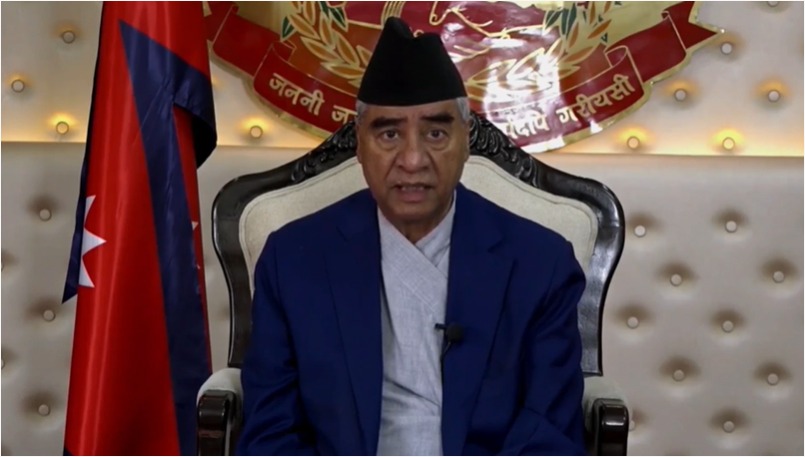
Himalayan controversy: Did Nepal sign up for US defence deal?
Nepal says it is neither a part of nor has any intention of joining the US State Partnership Program; a leaked letter suggests otherwise

Nepal has said it is neither a part of nor has any intention of joining the State Partnership Program (SPP) of the US. But a leaked letter puts the country’s government in a spot since it appears Nepal itself sought inclusion in the programme twice before being included.
Nepalese Home Minister Bal Krishna Khand’s statement last week saying the country will never be part of any defence pact came in response to a massive controversy involving the SPP after US Pacific Commander General Charles A Flynn’s visit.
Also read: Delhi cannot win Kashmir without winning hearts of Kashmiris
During his recent visit to Kathmandu, the top US general, who also visited India, raised the issue of Nepal’s participation in SPP during his meetings with Prime Minister Sher Bahadur Deuba and army chief General Prabhu Ram Sharma. But Deuba, who as defence minister has been under pressure from legislators and intellectuals now to come clear on the SPP issue, skipped Thursday’s parliament session when Khand made the statement.
What China, India might say
Politicians across the divide have voiced considerable opposition to Nepal joining a military pact with the US — that the country’s big neighbour China may have serious reservations about. Even India may not be totally comfortable, despite being a strategic partner of the US.
“I want to make it clear that Nepal is not involved in the SPP and has no intention to be part of it,” said Khand. “I would like to express this commitment on behalf of the government.” Stating that Nepal follows a policy of non-alignment, Khand said Nepal will never become part of any military alliance.
Earlier, on Wednesday, a number of lawmakers, including those from the ruling Nepali Congress and the main opposition CPN-UML, demanded that the Prime Minister come clean on the issue.
In response to lawmakers’ demand that the Parliament be informed about Deuba’s visit to the US, Khand said the visit is not fixed yet. Deuba is scheduled to visit Washington in the first official visit by a sitting Nepali PM in two decades, most probably in mid-July.
Also read: Know the story of this four centuries old throne in Nepal
The debate over the SPP has erupted just before PM Deuba’s planned visit to the US.
Embassy vs army’s claim
Amid controversy over the SPP, the US Embassy in Kathmandu said last Wednesday that the US accepted Nepal’s participation in 2019 after its two requests in 2015 and 2017. The Nepalese army, however, refuted the Embassy’s claims, saying there has been no agreement on SSP.
The US Embassy statement has considerably embarrassed Deuba’s ruling Nepali Congress because it was in power when the offer to join the SPP was apparently made by Nepal. But it has also raised doubts about the country’s once ruling Communists and Maoists.
A leaked Nepal army letter to the US made it evident that Kathmandu made the SPP offer first in 2015 and then in 2017.
But when the US decided to accept Nepal into the SPP in 2019, the government in Kathmandu was run by a coalition of the Communist Party of Nepal (Unified Marxist Leninist) and the Communist Party of Nepal (Maoist). Why the Communists and the Maoists quietly accepted the American programme, instead of backing off from the SPP, is open to question.
The October 2015 letter, signed by then Nepal army chief Rajendra Chhetri, requested the establishment of the National Guard State Partnership Program for Nepal. “As authorised by the government of Nepal, it is our honour to formally request the establishment of the National Guard State Partnership Program for Nepal,” reads the letter addressed to Alaina B Teplitz, then US Ambassador to Nepal.
Also read: Agnipath: Altering well-oiled system can have serious repercussions
“It is firmly believed that this program can promote long-term, enduring and mutually beneficial security relationships to exchange military skills and experience, share defence knowledge, enhance partnership capacity and further mutual security cooperation.”
The letter was leaked a day after the army refuted claims that Nepal is part of the SPP. Obviously, it leaves both the Nepali Congress and the Communist-Maoist combine with egg on their face.
Nepal’s predicament is in sharp contrast to the stance of Bangladesh, which has been negotiating two defence agreements with the US.
Bangladesh’s foreign secretary Masud Bin Momen recently said his country was not considering any defence hardware import from the US and would take its time over the two defence agreements under consideration.
(The writer is a former BBC correspondent and author of five books on South Asian conflicts)
(The Federal seeks to present views and opinions from all sides of the spectrum. The information, ideas or opinions in the articles are of the author and do not necessarily reflect the views of The Federal)

